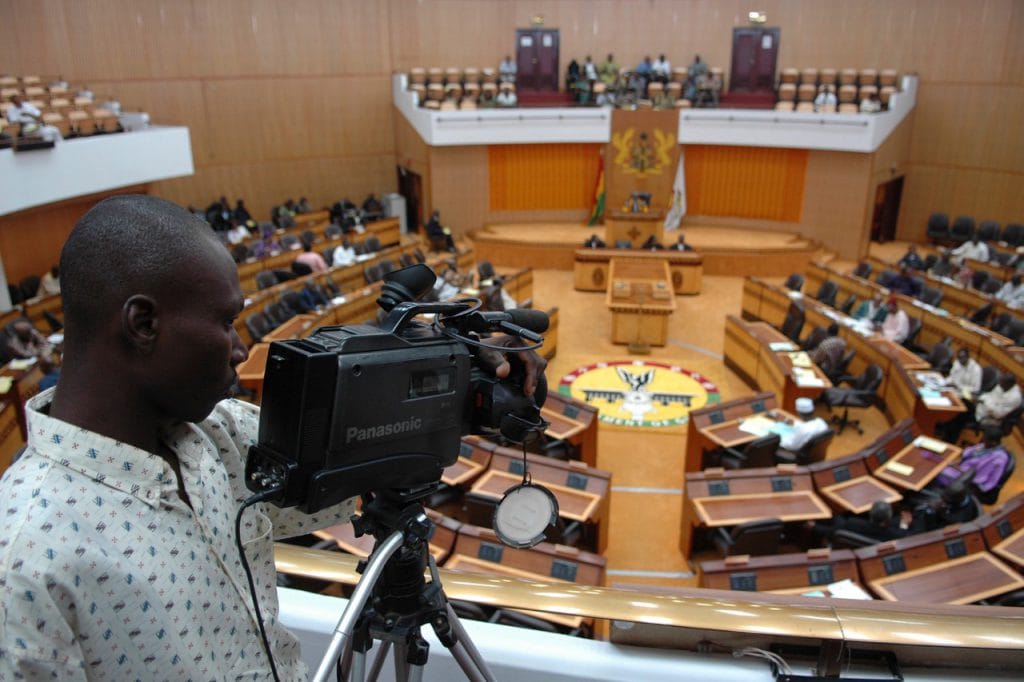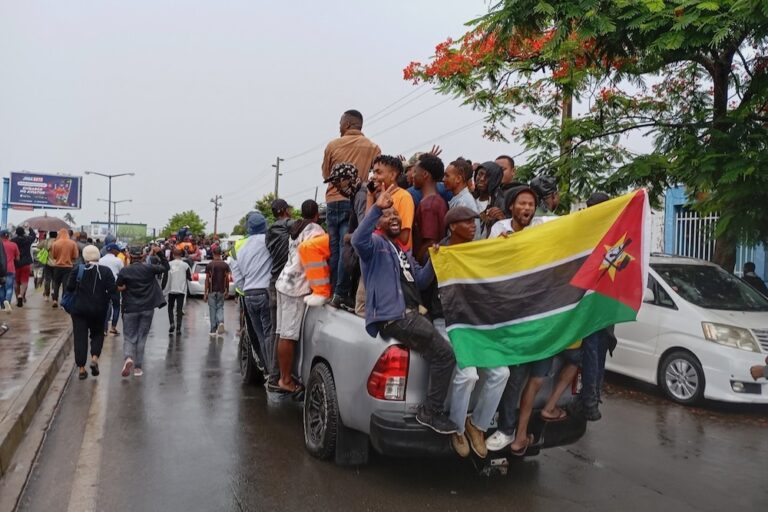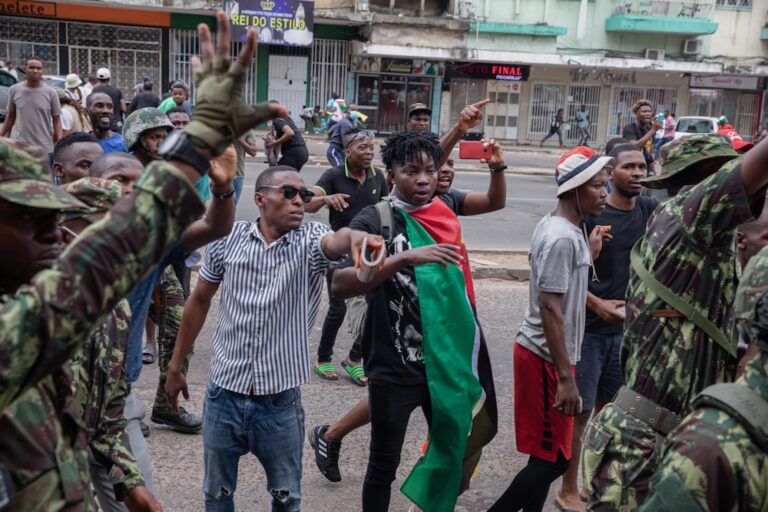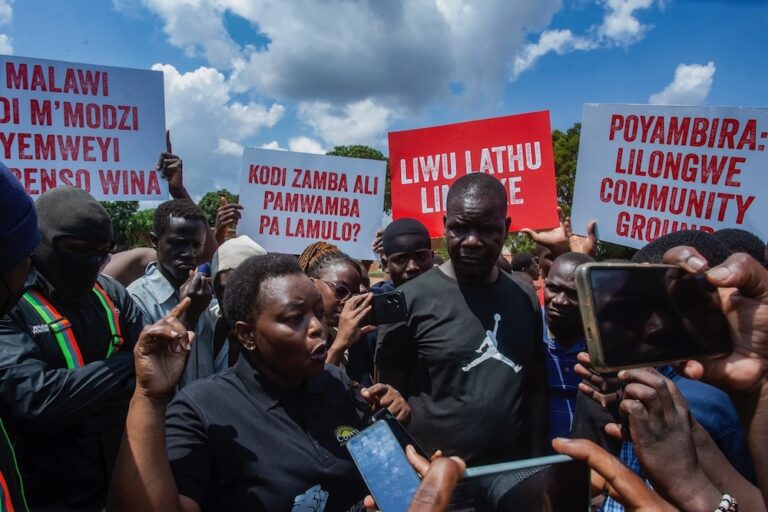March in Africa: A roundup of key free expression news, based on IFEX member reports.
March was an emotionally challenging time as consecutive tragedies hit the continent.
On 10 March, people across Africa had to deal with the news that an Ethiopian Airlines flight had crashed shortly after taking off from Addis Ababa en route to Nairobi. All 157 people on board were killed. Three days later, Cyclone Idai hit Mozambique and neighbouring countries Malawi and Zimbabwe, causing massive destruction and loss of lives. Then, headlines were dominated by news of the massacre of 134 Fulani herdsmen in what has been described as Mali;s worst inter-tribal conflict.
Amidst the misfortune there were two significant successes.
Ghana finally passes RTI Bill
The month ended on a triumphant note when Ghana’s Parliament passed and approved the Right to Information Bill after its third reading on 26 March.
Wonderful news for #infoaccess and #transparency from #Ghana where the #RTI law has finally been passed. Well done to all who have made this possible. Good timing before #wpfd19. Let’s make sure it’s implemented well. #SDG16 #right2know @guyberger @EUinUG @europeaid @media4dem https://t.co/KXZfw8e8nj
— Caroline Giraud (@Karolinushka) March 27, 2019
Over the years, the Media Foundation for West Africa (MFWA) and numerous civil society organisations and coalitions including OccupyGhana®, the Media Coalition on RTI Bill (MCRTI), and the Coalition on the Right to Information (CRTI) have advocated and lobbied for the passing of this law. Last November, there was a call for Ghanaians to wear red on Fridays and post pictures of themselves on social media with the hashtag #RTIRedFriday, as a demonstration of their collective resolve in getting the bill passed.
While the RTI law has been described as one of the best in the world by Alban Bagbin, the second deputy speaker of parliament, the MCRTI has raised concerns about some of the clauses that are likely obstacles to accessing information.
Scribbling schoolgirls in Burundi released
The second celebratory moment was the release of three Burundi schoolgirls who had been arrested and detained for scribbling on a picture of President Pierre Nkurunziza in textbooks. The backlash over the arrest of the girls, aged 15, 16 and 17, manifested into an online social media campaign under the hashtag #Burundi #FreeOurGirls. In solidarity with the girls and to protest their detention, social media users all over the world were invited to doodle on images of President Nkurunziza – possibly making him one of the most trendy and trending posts on Twitter.
Stop being petty Nkurunziza. Scribbling has never been a crime. #FreeOurGirls pic.twitter.com/aPrUC85PxZ
— D EAST ???????? (@DEAST07299820) March 25, 2019
Burundi seems to have a penchant for arresting schoolchildren. In June 2016, the country’s intelligence agents arrested eight secondary school students for drawing and writing phrases like “Get out” or “No to the 3rd term” on a picture of President Pierre Nkurunziza in a textbook.
Petition to end Chad’s social media shutdown
Eighty organisations together with the African Freedom of Expression Exchange (AFEX) signed a petition, urging Lawrence Mute, African Union Special Rapporteur on Freedom of Expression and Access to Information in Africa, to take action to restore online access to social media platforms which have been blocked by the Chadian government for a year.
In their analysis, Global Voices pointed out that restricted access translates into an average of only 5% of Chadian citizens having access to the internet, making it the lowest in Africa. In a blogpost describing the situation, Pablo Michelot, editor in chief of l’Encro Noir, aptly titled his blog: The world is a village from which Chadians are excluded.
Following the petition, Mute issued a brief press release in which he communicated that a letter of appeal had been sent to Idriss Deby, the President of the Republic of Chad, regarding the shutdown.
Journalist Karima Brown to challenge attacks in court
In South Africa, days before International Women’s Day global celebrations, journalist Karima Brown was inundated with insulting, misogynous and racists texts, calls for her to be raped, and explicit threats against her life.
These followed an online screenshot of Brown’s phone number posted by Julius Malema, leader of the Economic Freedom Fighters (EFF) party on his Twitter account. He accused Brown of being a state agent after she had mistakenly posted a watching brief meant for her eNCA colleagues to the EFF media WhatsApp group.
Brown has filed a complaint of intimidation with the police and is also preparing to take the EFF to the Electoral Court. The South African National Editors Forum condemned what it termed “the systemic, abusive and cruel social media attack”.
A few days later, online media was flooded with inspirational and congratulatory messages for International Women’s Day, from commemorating Africa’s first female member of Parliament Mabel Dove from Ghana to applauding Frehiwot Tamiru, the CEO of one of Africa’s largest telecommunications operator – state owned Ethio Telecom.
#WomanOfTheHour is Ghana’s (and Africa’s) first female MP Mabel Dove Danquah (1905–1984). She was also a journalist, political activist and creative writer, one of the earliest women in West Africa to work in these fields. #InternationalWomensDay #IWD2019 #BalanceForBetter pic.twitter.com/ZeowuuYA1n
— UK in Ghana ???????????????? (@UKinGhana) March 8, 2019
Ethiopia’s state-owned telecoms operator, Ethio Telecom has 66.2 million subscribers, making it one of Africa’s largest telecoms operators. The CEO, Frehiwot Tamiru is a woman. #IWD #InternationalWomensDay pic.twitter.com/NnqUvQZR4j
— Africa Facts Zone (@AfricaFactsZone) March 8, 2019
In brief
In its latest report titled Despots and Disruptions: Five Dimensions of Internet Shutdowns in Africa, the Collaboration on International ICT Policy for East and Southern Africa (CIPESA) looks at the correlation between the level of authoritarianism in a country, the reluctance of that country’s leader to relinquish power and the likelihood of an internet disruption or shutdown.
AFEX and the Zimbabwe chapter of the Media Institute of Southern Africa issued separate statements expressing deep concern over the internet and media shutdowns as well as the punitive actions taken by governments on the continent against journalists for their critical reporting.
@AFEXafrica says it is deeply concerned about increasing rate at which governments on continent are quick to penalise journalists critical of their policies or practices: https://t.co/f89bpEZebP @KahWalla @samirasawlani @AJListeningPost @AJEnglish @RaheelaMahomed
— IFEX (@IFEX) March 23, 2019
Cameroonian journalist Adrienne Engono Moussang was picked up by police from her home. A journalist with the daily Mutations, Moussang, who specialises on environmental and health issues, was first taken to an unknown location and then moved to the 14th district in Yaounde. No reason was given for her arrest and she was released after a few hours.
Journalists in Nigeria were detained, harassed, assaulted and in some cases forced to delete photographs during the 9 March gubernatorial and state assembly elections. The Committee to Protect Journalists (CPJ) is calling on Nigerian authorities to investigate and hold accountable those responsible. The violence, which has been condemned by Amnesty International, worsened during the 23 March re-run election in Kano.
Amnesty International is calling Nigerian authorities @MBuhari @ProfOsinbajo to investigate allegations of widespread violence & intimidation unleashed on voters and journalists during Saturday’s re-run election in Kano. The unprecedented violence in Kano also lead to fatalities.
— Amnesty Int. Nigeria (@AmnestyNigeria) March 26, 2019



